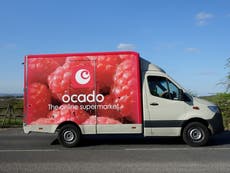Ocado boss Tim Steiner unimpressed with idea of new digital taxes but his company will fly regardless
The firm is reaping the rewards of its impressive record when it comes to business investment, writes James Moore


With digital sales and excess profits taxes actively under consideration, Ocado boss Tim Steiner had some thoughts as he presented the group’s final results. As you might expect, the leader of this rare London-listed tech star made it clear that he isn’t a fan of either.
Steiner described the idea of a pandemic related excess profits levy as “inappropriate”.
“People who make profits generate taxes. So if you make more profits you generate more taxes,” he said.
What about a digital sales tax, to fund a reduction in business rates and level the playing field between digital retailers and bricks and mortar store operators, an idea floated by Tesco among others?
Steiner argued that VAT already provides a level playing field regardless of where a retailer is located. And he noted archly that the big four grocers weren’t overly concerned about the high street when they were throwing up out of town supermarkets.
On the first point he was, perhaps, being a trifle disingenuous. More profit ought to equal more tax but when it comes to big tech it doesn’t always work that way. The reason is tech companies' (legal) gaming of an international tax system designed for the 19th century rather than the 21st. Efforts at reform have proceeded at the pace of a tortoise with a torn ACL.
That, in addition to the boom they have enjoyed through the pandemic, is why such a move on the part of Rishi Sunak would prove highly popular with the public.
Steiner was on firmer ground with the Tesco tax. As I wrote yesterday, Ocado’s larger rival would set it at 1 per cent across the board. This would fund a 20 per cent cut in business rates, a levy which falls disproportionately upon bricks and mortar store operators.
His point about those out of town stores counts as a fine jab at his rivals but you can still make the case for such a levy on grounds of levelling the playing field. It's just that it isn't on its own going to save the high street and it's naive to think that it will, a point I made yesterday.
What Ocado's results underlined is that this is a business that has been investing heavily in its product. Capital expenditure basically doubled this year to north of half a billion pounds. It will hit £700m in the current financial year.
The group’s activity on the capital markets means it has the capacity to continue the charge for some time. In a country with a notably poor record when it comes to business investment, Ocado stands out. It’s the lone player on a park football team that the scouts come to watch.
The money will be spent on building new customer fulfilment centres here and abroad, and on improving the group’s top of the line tech.
Ocado has, meanwhile, been innovating as it grows and is rolling out its convenience service to new postcodes. “The landscape for food retailing is changing, for good,” said Steiner. He’s not wrong about that.
The dilemma for chancellor Rishi Sunak is that he really wouldn’t want to be seen to be discouraging a company like this one, especially at a time when the government is trying to lure more tech firms to a London market where they are conspicuous by their absence.
The decision on whether to press ahead with one or both of these new levies is therefore going to be finely balanced.
Here’s the thing: virtue is its own reward. Ocado's results demonstrate that. Its retail arm, now a joint venture with M&S, turned in a 35 per cent increase in sales.
The company’s willingness to invest means it should ultimately emerge smiling, whatever the chancellor does. Taking its foot off the gas would, meanwhile, be an example of cutting off its nose to spite its face. Steiner is far too smart to do that.



Join our commenting forum
Join thought-provoking conversations, follow other Independent readers and see their replies
Comments